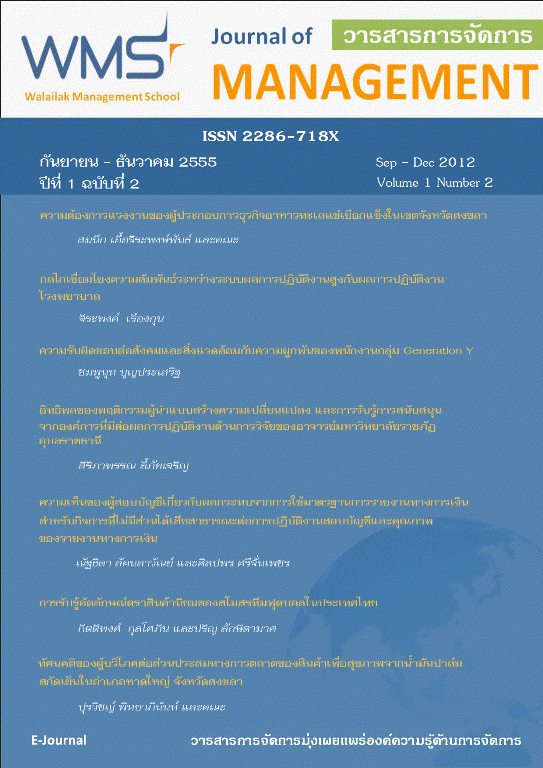Auditor's Opinion about the Effect of TFRS for NPAEs Accounting Standard Adoption on Auditing Procedures and Financial Reporting Quality
Main Article Content
Abstract
Article Details
References
นิพันธ์ เห็นโชคชัยชนะ และ ศิลปพร ศรีจั่นเพชร “ทฤษฎีการบัญชี” 2554
นิพันธ์ เห็นโชคชัยชนะ ศิลปพร ศรีจั่นเพชร พจน์ วีรศุทธากร และพิมพ์ใจ วีรศุทธากร “คู่มือการบัญชี NPAEs” 2554
ศิลปพร ศรีจั่นเพชร และ พจน์ วีรศุทธากร “วารสารวิชาชีพบัญชี” ปีที่ 7 ฉบับที่ 18 เมษายน 2554 หน้า 62-74
สภาวิชาชีพบัญชี ใพระบรมราชูปถัมภ์ "มาตรฐานการรายงานทางการเงินสำหรับกิจการที่ไม่มีส่วนได้เสียสาธารณะ" 2554
สภาวิชาชีพบัญชี ใพระบรมราชูปถัมภ์ "มาตรฐานการสอบบัญชี รหัส 300 เรื่อง การวางแผนตรวจสอบงบการเงิน." สภาวิชาชีพบัญชีในพระบรมราชูปถัมภ์ 2554
สภาวิชาชีพบัญชี ใพระบรมราชูปถัมภ์ "แม่บทการบัญชี" 2552
Street, D., and R. Larson (2004): "Large Accounting Firms' survey reveals emergence of "Two Standard" system in the European Union", Advances in international accounting, Vol.17, 1-29.
Fitzpatrick, M. & Frank, F., 2009, “IFRS for SMEs”: The Next Standard for U.S. Private Companies?, http://www.journalofaccountancy.com/Issues/2009/Dec/20091928.htm
Herman: (2009). IFRS for SMEs : Not for American Private Company. The CPA Journal.
Gerhardy, P.G.(2005): A Review of the Costs and Benefits of Australian Adoption of IFRS. RESEARCH PAPER SERIES. RESEARCH PAPER SERIES: 05-4 ed. Melbourne, Flinders University.
Deloitte and Touche, LLP. (2009): IFRS Survey 2009 for Private Companies.
International Accounting Standards Board (IASB). 2009. IFRS for SMEs. Available at http://www.iasb.org/Current%20Projects/IASB%20Projects/Small%20and%20Mediumsized%20Entities/Small%20and%20Medium-sized%20Entities.htm
Accounting Standards Board of Canada, Implementation Plan for Incorporating IFRSs into Canadian GAAP (2007).


